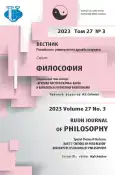Friedrich Jacobi: Only Madman Can Be Follower of Kant!
- Авторлар: Chernov S.A.1
-
Мекемелер:
- The Bonch-Bruevich Saint Petersburg State University of Telecommunications
- Шығарылым: Том 27, № 3 (2023): KANT’S “CRITIQUE OF PURE REASON” AND WAYS OF ITS READING BY PHILOSOPHERS
- Беттер: 513-526
- Бөлім: KANT’S “CRITIQUE OF PURE REASON” AND WAYS OF ITS READING BY PHILOSOPHERS
- URL: https://journal-vniispk.ru/2313-2302/article/view/325233
- DOI: https://doi.org/10.22363/2313-2302-2023-27-3-513-526
- EDN: https://elibrary.ru/DCEVIW
- ID: 325233
Дәйексөз келтіру
Толық мәтін
Аннотация
Friedrich Jacobi (1743-1819) is known mainly as a representative of the “philosophy of feeling and faith” and as one of the first critics of Kant, who drew attention to the fundamental contradiction in his system: without the concept of “thing in itself” (or “thing in oneself”) it is impossible to enter into his “Critique of Pure Reason”, but it is equally impossible to remain in it with this concept. The consistent development of the transcendental philosophy system leads to the elimination of its own initial, fundamental premise. The discovery of this contradiction and the indication of its significance for the evaluation of critical philosophy was often seen as almost the only contribution of Jacobi to world philosophy. In the historical and philosophical literature, the opinion prevails is that Jacobi, by and large, simply did not understand Kant and was in comparison with him, just a “grumpy scoundrel” (Heinrich Heine) and a “lower monad” (Kuno Fischer). This pejorative assessment significantly simplifies and distorts both Jacobi’s philosophy and Jacobi’s actual attitude towards Kant, which was not so unambiguous. It should be considered in a much broader historical and problematic context. The study briefly examines the history of the long and difficult relationship between the “privileged heretic” and the “gray eminence” of the German philosophical classics with the creator of the transcendental philosophy system. The main directions of a deeply thought-out and well-founded serious criticism of Kant’s philosophy (i.e. its inconsistency, idealism, rational intellectualism, subjectivism, “speculative egoism”, etc.) are outlined and analyzed from the positions of radical realism, common sense, Christian faith, metaphysical “sense of the supersensible”, direct knowledge of the most important truths for a person, the absolute values of life, moral intuition, freedom, and dignity of the individual.
Негізгі сөздер
Авторлар туралы
Sergey Chernov
The Bonch-Bruevich Saint Petersburg State University of Telecommunications
Хат алмасуға жауапты Автор.
Email: stchernov@mail.ru
ORCID iD: 0000-0003-4420-8973
PhD in Philosophy, Professor, Department of Social and Political Sciences
61 River Moika Emb., 191186, Saint Petersburg, Russian FederationӘдебиет тізімі
- Jacobi FH. Über die Lehre des Spinoza, in Briefen an Herrn Moses Mendelssohn. In: Friedrich Heinrich Jacobi’s Werke. 6 Bände. Bd. 4/1. Leipzig: Fleischer; 1812-1825. S. 37-253.
- Kant I. Study of the degree of clarity of the principles of natural theology and morality. In: Works in 6 vol. Vol. 2. Moscow: Mysl’ publ.; 1964. P. 243-276. (In Russian).
- Kant I. The only possible basis for proving the existence of God. In: Works in 6 vol. Vol. 1. Moscow: Mysl’ publ.; 1964. P. 391-508. (In Russian).
- Jacobi FH. Eduard Allwills Papiere. Iris. 1775;IV(3):193-236.
- Jacobi FH. Allwills Briefsammlung. In: Friedrich Heinrich Jacobi’s Werke. 6 Bände. Bd. 1. Leipzig: Fleischer; 1812-1825. S. 1-226.
- Jacobi FH. Vorbericht. In: Friedrich Heinrich Jacobi’s Werke. 6 Bände. Bd. 4/1. Leipzig: Fleischer; 1812-1825. S. VI-LIV.
- Jacobi FH. Woldemar. 2 Theile. Neue verbesserte Ausgabe. Königsberg; 1796.
- Kozhevnikov VA. Philosophy of feeling and faith in its relationship to literature and rationalism of the 18th century and to critical philosophy. Part I. Moscow: G. Lisner and A. Geschel publ.; 1897. (In Russian).
- Jacobi FH. Ueber die Lehre des Spinoza in Briefen an den Herrn Moses Mendelssohn. Δος μοι που στω. Breslau: bey Gottl. Löwe; 1785.
- Kant I. Critique of pure reason. Lossky NO, transl. with options transl. in Russian and European languages. Moscow: Nauka publ.; 1998. (In Russian).
- Jacobi FH. David Hume über den Glauben, oder Idealismus und Realismus. Ein Gespräch. In: Friedrich Heinrich Jacobi’s Werke. 6 Bände. Bd. 2. Leipzig: Fleischer; 1812-1825. S. 1-310.
- Kant I. Briefwechsel. In: Kantʼs Gesammelte Schriften. Hrsg. von der Königlich Preußischen Akademie der Wissenschaften. Bd. 10. Berlin: De Gruyter; 1922.
- Kant I. What does it mean to be guided in thinking? In: Works in German and in Russian. Vol. 1. Moscow: Kami publ.; 1994. P. 227-237. (In Russian).
- Hölters H. Der spinozistische Gottesbegriff bei M. Mendelssohn und F.H. Jacobi und der Gottesbegriff Spinozas. Emsdetten: Heinr. & Lechte; 1938.
- Jacobi FH. Epistel über die Kantische Philosophie. In: Werke: Gesamtausgabe. Hrsg. von Hammacher K und Jaeschke W. Bd. 1,2. Schriften zum Transzendentalen Idealismus. Hamburg: Felix Meiner Verlag; 2004. S. 123-161.
- Jacobi FH. Jacobi an Fichte. In: Friedrich Heinrich Jacobi’s Werke. 6 Bände. Bd. 3. Leipzig: Fleischer; 1812-1825. S. 1-57.
- Fichte IG. The second introduction to sciencedoctrine. In: Works in two volumes. Vol. 1. Moscow: Mithril publ.; 1993. P. 477-546. (In Russian).
- Jacobi FH. Ueber das Unternehmen des Kriticismus, die Vernunft zu Verstande zu bringen, und der Philosophie überhaupt eine neue Absicht zu geben. Beyträge zur leichtern Uebersicht des Zustandes der Philosophie beym Anfange des 19. Jahrhunderts. 1802;(3):1-110.
- Jacobi FH. Vorrede, zugleich Einleitung in des Verfassers sämtliche philosophische Schriften. In: Friedrich Heinrich Jacobi’s Werke. 6 Bände. Bd. 2. Leipzig: Fleischer; 1812-1825. S. 3-123.
- Jacobi FH. Von den göttlichen Dingen und ihrer Offenbarung. In: Friedrich Heinrich Jacobi’s Werke. 6 Bände. Bd. 3. Leipzig: Fleischer; 1812-1825. S. 245-460.
- Aus FH. Jacobi’s Nachlaß. Ungedruckte Briefe von und an Jacobi und Andere. Hrsg. von Zoeppritz R. Bd. 1. Leipzig: Engelmann; 1869.
- Jacobi FH. Über das Unternehmen des Kriticismus, die Vernunft zu Verstande zu bringen. In: Friedrich Heinrich Jacobi’s Werke. 6 Bände. Bd. 3. Leipzig: Fleischer; 1812-1825. S. 59-195.
Қосымша файлдар









